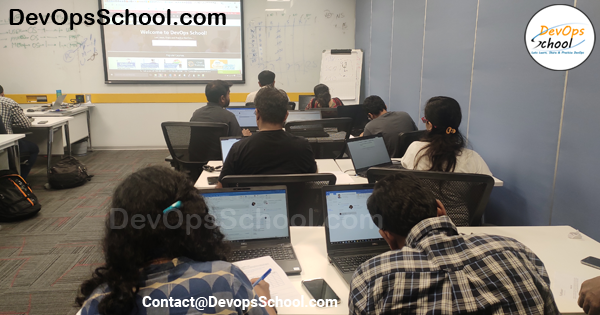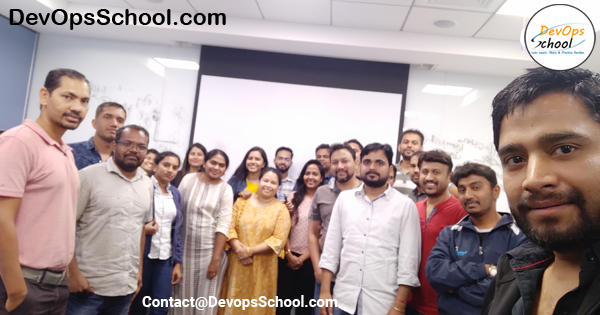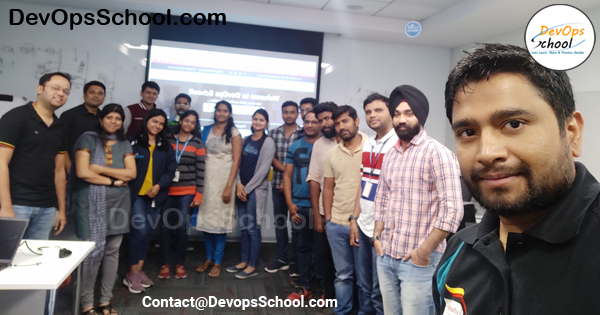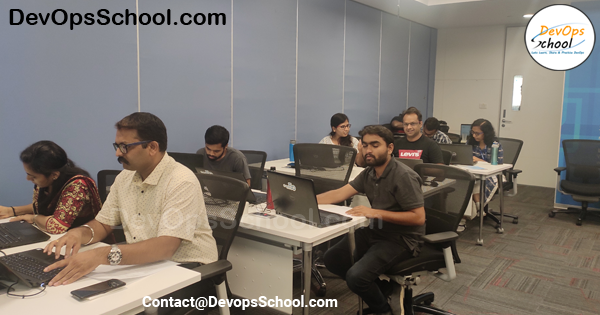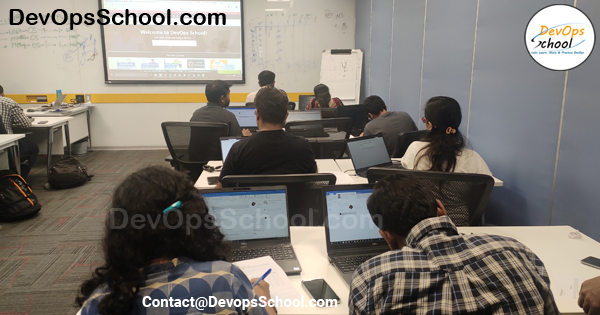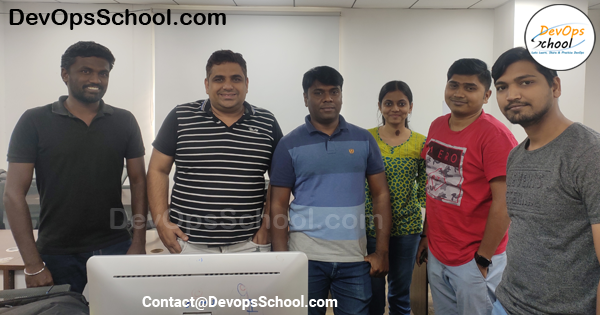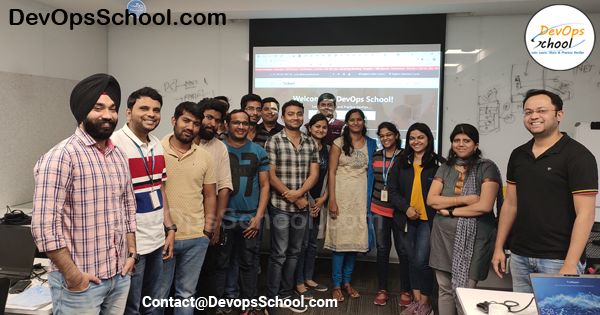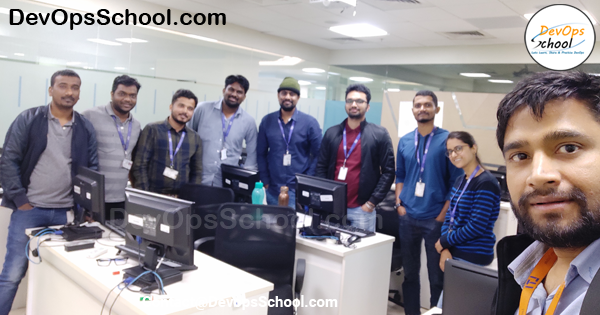About this Course and Certification
The AppDynamics Course and Certification Program offered by AI Universe in collaboration with DevOpsSchool.com is a meticulously designed training program aimed at equipping IT professionals, DevOps engineers, system administrators, and developers with the skills necessary to effectively monitor, analyze, and optimize application performance using AppDynamics. This comprehensive course spans fundamental concepts to advanced techniques, ensuring that participants gain both theoretical knowledge and practical experience.
Key Highlights:
- Duration: 5 Days (40 Hours)
- Mode of Delivery: Online Live Instructor-led Training
- Certification: Industry-recognized AppDynamics Certification upon successful completion
- Prerequisites: Basic understanding of application development and IT infrastructure
Why Choose This Program?
- Expert Instruction: Learn from seasoned professionals with extensive experience in application performance management.
- Hands-on Learning: Engage in practical lab exercises that simulate real-world scenarios.
- Comprehensive Curriculum: Cover all aspects of AppDynamics, from installation to advanced analytics.
- Flexible Learning: Access course materials and recorded sessions anytime, ensuring learning at your own pace.
By enrolling in this program, you will not only master AppDynamics but also enhance your ability to contribute to your organization’s operational efficiency and application reliability.
What is AppDynamics?
AppDynamics is a leading Application Performance Management (APM) solution developed by Cisco. It provides real-time monitoring and analytics for applications, enabling organizations to gain deep insights into their software’s performance and user experience. AppDynamics helps in identifying and resolving performance bottlenecks, ensuring optimal application functionality and enhancing business outcomes.
Core Components of AppDynamics:
- Controller: The central management server that collects and analyzes performance data.
- Agents: Lightweight components installed on application servers to gather performance metrics.
- Business iQ: Provides business-level insights by correlating application performance with business KPIs.
- End User Monitoring (EUM): Tracks user interactions and experiences across web and mobile applications.
- Database Visibility: Monitors database performance and queries to identify and resolve database-related issues.
- Machine Agent: Collects infrastructure-level metrics from servers, VMs, and cloud environments.
Key Features:
- Real-Time Monitoring: Continuous tracking of application performance metrics.
- Transaction Tracing: Detailed analysis of individual transactions to identify delays and errors.
- Dynamic Baselines: Automated detection of performance anomalies by comparing against historical data.
- Dashboards and Reporting: Customizable visualizations and reports for various stakeholders.
- Integration Capabilities: Seamless integration with DevOps tools, cloud platforms, and third-party applications.
AppDynamics is widely adopted across industries for its robust capabilities in ensuring application reliability, enhancing user satisfaction, and driving business growth.
Why is AppDynamics Important?
In today’s digital era, where applications are the backbone of business operations, ensuring their optimal performance is crucial. AppDynamics plays a pivotal role in achieving this by offering comprehensive insights and proactive management capabilities.
Importance of AppDynamics:
- Enhanced Visibility:
- Full-Stack Monitoring: Provides end-to-end visibility across applications, infrastructure, and user experience.
- Real-Time Analytics: Immediate access to performance data helps in swift decision-making.
- Proactive Issue Resolution:
- Anomaly Detection: Identifies unusual patterns and potential issues before they escalate.
- Root Cause Analysis: Quickly pinpoints the underlying causes of performance problems.
- Improved User Experience:
- End User Monitoring: Ensures that applications meet user expectations by tracking real user interactions.
- Performance Optimization: Continuously fine-tunes application performance to maintain high availability and responsiveness.
- Operational Efficiency:
- Automated Workflows: Streamlines incident management and remediation processes.
- Integration with DevOps: Facilitates collaboration between development and operations teams for faster deployments and continuous improvement.
- Business Impact:
- Reduced Downtime: Minimizes application outages and service disruptions, safeguarding revenue and reputation.
- Data-Driven Insights: Aligns IT performance with business goals through actionable insights and reporting.
Career Advantages:
- High Demand Skills: Proficiency in AppDynamics is highly sought after in the job market, especially for roles in DevOps, SRE, and IT operations.
- Competitive Edge: Certification and expertise in AppDynamics can set you apart from peers, opening doors to advanced career opportunities and higher earning potential.
In summary, AppDynamics is essential for organizations aiming to maintain high-performance applications, ensuring seamless user experiences, and driving business success.
Course Features
Our AppDynamics Course and Certification Program offers a range of features designed to provide an enriching and effective learning experience:
- Comprehensive Curriculum:
- Structured Learning Path: Organized modules covering all aspects of AppDynamics, from basics to advanced topics.
- Up-to-Date Content: Latest features and best practices incorporated into the training materials.
- Expert Instructors:
- Industry Professionals: Learn from Rajesh Kumar, a seasoned AppDynamics expert with extensive hands-on experience.
- Interactive Sessions: Opportunities for live Q&A and personalized guidance.
- Hands-On Labs:
- Practical Exercises: Real-world scenarios to apply theoretical knowledge.
- Sandbox Environment: Safe space to experiment and explore AppDynamics functionalities without impacting live systems.
- Flexible Learning Options:
- Live Online Classes: Participate from anywhere with a stable internet connection.
- Recorded Sessions: Access recordings for revision and deeper understanding.
- Comprehensive Study Materials:
- Detailed Documentation: In-depth guides covering all course topics.
- Video Tutorials: Step-by-step walkthroughs of key AppDynamics features and configurations.
- Interactive Quizzes: Reinforce learning and assess your understanding.
- Certification Exam Preparation:
- Mock Tests: Simulate the actual certification exam environment.
- Exam Strategies: Tips and techniques to approach and excel in the certification assessment.
- Post-Course Support:
- Access to Community Forums: Engage with peers and experts for ongoing support and knowledge sharing.
- Continuous Updates: Receive updates on new AppDynamics features and training materials.
- Lifetime Access:
- Resource Library: Unlimited access to all course materials and future updates.
- Revisit at Your Pace: Learn and review content as needed to reinforce your skills.
- Networking Opportunities:
- Peer Interaction: Connect with fellow professionals from diverse industries.
- Expert Access: Direct access to instructors for mentorship and career advice.
- Money-Back Guarantee:
- Satisfaction Assurance: Full refund available if you’re not satisfied with the course within a specified period.
These features are meticulously curated to ensure that participants not only gain theoretical knowledge but also develop the practical skills necessary to excel in real-world application performance management using AppDynamics.
Training Objectives
The AppDynamics Course and Certification Program is designed with clear and actionable objectives to ensure that participants gain a deep and practical understanding of application performance management using AppDynamics. By the end of this training, participants will be able to:
- Understand Application Performance Management (APM):
- Grasp the fundamental concepts and importance of APM in modern IT environments.
- Differentiate between various APM tools and understand where AppDynamics fits in the landscape.
- Master AppDynamics Architecture and Components:
- Comprehend the architecture of AppDynamics, including Controllers, Agents, and Machine Agents.
- Learn the roles and interactions of different AppDynamics components in monitoring applications.
- Install and Configure AppDynamics:
- Execute the installation of AppDynamics Controllers and Agents across different platforms.
- Configure AppDynamics for various application environments, including on-premises and cloud-based deployments.
- Implement Application Monitoring:
- Set up monitoring for different application tiers and services.
- Configure dashboards, alerts, and notifications to track key performance indicators (KPIs).
- Conduct Transaction and Business Performance Monitoring:
- Utilize transaction snapshots to analyze and troubleshoot performance issues.
- Link application performance metrics with business outcomes using Business iQ.
- Perform Root Cause Analysis:
- Identify and diagnose performance bottlenecks using AppDynamics’ diagnostic tools.
- Conduct deep-dive analyses to uncover the root causes of application performance issues.
- Optimize Application Performance:
- Apply best practices for performance tuning and optimization.
- Implement strategies to enhance application scalability and reliability.
- Integrate AppDynamics with DevOps Tools:
- Integrate AppDynamics with CI/CD pipelines, configuration management tools, and other DevOps practices.
- Automate monitoring and performance management processes within the DevOps lifecycle.
- Leverage Advanced Features:
- Utilize machine learning capabilities for anomaly detection and predictive analytics.
- Customize AppDynamics dashboards and reports to meet specific organizational needs.
- Prepare for AppDynamics Certification:
- Gain the knowledge and skills required to successfully pass the AppDynamics certification exam.
- Develop a solid foundation for continuous learning and professional growth in APM.
These objectives ensure that participants not only learn how to use AppDynamics effectively but also understand how to leverage its full potential to drive performance improvements and support business objectives.
Target Audience
The AppDynamics Course and Certification Program is tailored for a diverse group of IT professionals seeking to enhance their expertise in application performance management. The ideal candidates for this training include:
- DevOps Engineers:
- Professionals responsible for integrating development and operations processes.
- Seeking to incorporate APM tools like AppDynamics into their CI/CD pipelines.
- Site Reliability Engineers (SREs):
- Engineers focused on maintaining the reliability and scalability of applications.
- Looking to utilize AppDynamics for monitoring and incident management.
- System Administrators:
- IT personnel managing servers, infrastructure, and application deployments.
- Interested in using AppDynamics to monitor system performance and troubleshoot issues.
- Application Developers:
- Developers involved in designing, building, and maintaining applications.
- Aiming to identify and resolve performance bottlenecks during the development lifecycle.
- IT Managers and Team Leads:
- Leaders overseeing IT operations and development teams.
- Seeking to understand APM tools to better manage team performance and application reliability.
- Performance Analysts:
- Specialists focused on analyzing and improving application performance.
- Looking to deepen their knowledge of AppDynamics for more effective analysis.
- Business Analysts:
- Professionals interested in linking application performance metrics with business outcomes.
- Wanting to leverage Business iQ for data-driven decision-making.
- Database Administrators (DBAs):
- DBAs responsible for managing and optimizing database performance.
- Interested in using AppDynamics for database visibility and monitoring.
- Cloud Architects:
- Architects designing and managing cloud-based applications and infrastructure.
- Looking to integrate AppDynamics for comprehensive cloud application monitoring.
- Technical Consultants:
- Consultants advising organizations on IT solutions and optimizations.
- Seeking expertise in AppDynamics to offer valuable insights and recommendations to clients.
Experience Levels:
- Beginner to Intermediate: Individuals new to AppDynamics or APM tools, looking to build foundational knowledge.
- Experienced Professionals: Those with prior experience in APM seeking to advance their skills and achieve certification.
Educational Background:
- Bachelor’s Degree in Computer Science, Information Technology, or related fields.
- Relevant certifications and training in DevOps, IT Operations, or Application Development are advantageous but not mandatory.
This course is designed to accommodate varying levels of expertise, ensuring that both newcomers and seasoned professionals can benefit and achieve their learning goals.
Training Methodology
The AppDynamics Course and Certification Program employs a multi-faceted training methodology to cater to diverse learning styles and ensure comprehensive understanding and skill acquisition. The methodology encompasses the following elements:
- Live Instructor-Led Sessions:
- Interactive Lectures: Engage with expert instructors through live sessions that cover theoretical concepts and practical applications.
- Real-Time Q&A: Address queries and clarify doubts instantly during the sessions.
- Hands-On Lab Exercises:
- Practical Application: Participate in guided lab exercises that simulate real-world scenarios, enabling hands-on experience with AppDynamics.
- Step-by-Step Guidance: Receive detailed instructions and support from instructors to complete lab tasks successfully.
- Case Studies and Real-World Examples:
- Contextual Learning: Analyze real-life case studies to understand how AppDynamics is implemented in various industries and environments.
- Problem-Solving: Apply learned concepts to solve actual performance management challenges faced by organizations.
- Collaborative Workshops:
- Group Activities: Engage in collaborative workshops that foster teamwork and collective problem-solving.
- Peer Learning: Share insights and learn from the experiences of fellow participants.
- Assessments and Quizzes:
- Knowledge Checks: Regular quizzes and assessments to evaluate understanding and reinforce learning.
- Progress Tracking: Monitor your advancement through the course with periodic evaluations.
- Interactive Demonstrations:
- Live Demonstrations: Observe live demonstrations of AppDynamics features and configurations to visualize their application.
- Feature Walkthroughs: Detailed walkthroughs of specific AppDynamics functionalities to ensure thorough comprehension.
- Self-Paced Learning Materials:
- Study Guides and Documentation: Access comprehensive study materials to review concepts at your own pace.
- Recorded Sessions: Revisit recorded lectures and demonstrations for reinforcement and clarification.
- Personalized Feedback:
- Performance Reviews: Receive personalized feedback on assessments and lab exercises to identify strengths and areas for improvement.
- One-on-One Sessions: Opportunity for individual consultations with instructors for tailored guidance.
- Continuous Support:
- Dedicated Support Channels: Access to support through forums, email, or chat for ongoing assistance during and after the course.
- Resource Sharing: Continuous updates and resources provided to keep up with the latest AppDynamics developments.
- Certification Exam Preparation:
- Exam-Oriented Training: Focused sessions and materials designed to prepare participants for the AppDynamics certification exam.
- Mock Exams: Simulated exams to familiarize participants with the certification format and question types.
Benefits of This Methodology:
- Comprehensive Understanding: Combines theoretical knowledge with practical skills to ensure a well-rounded learning experience.
- Engagement and Interaction: Promotes active participation and engagement, enhancing retention and application of knowledge.
- Flexibility: Accommodates different learning paces and schedules, making it accessible for working professionals.
- Immediate Application: Enables participants to apply learned concepts immediately in their professional environments, reinforcing learning outcomes.
This robust training methodology ensures that participants not only learn the intricacies of AppDynamics but also develop the confidence and competence to implement and manage application performance effectively in their organizations.
Training Materials
Participants enrolled in the AppDynamics Course and Certification Program will have access to a rich repository of training materials designed to support various aspects of learning. These materials are curated to enhance understanding, facilitate hands-on practice, and provide resources for continuous learning.
Included Training Materials:
- Comprehensive Study Guides:
- Detailed Chapters: In-depth explanations of AppDynamics concepts, features, and best practices.
- Diagrams and Illustrations: Visual aids to simplify complex topics and enhance comprehension.
- Lecture Presentations:
- Slide Decks: Professionally designed slides covering each module’s key points for easy reference.
- Speaker Notes: Supplementary notes to accompany presentations, providing additional insights.
- Video Tutorials:
- Recorded Sessions: Access to recorded live lectures and demonstrations for review and self-paced learning.
- Feature Walkthroughs: Step-by-step video guides on configuring and using various AppDynamics functionalities.
- Hands-On Lab Manuals:
- Lab Instructions: Detailed guides outlining the steps for each lab exercise, including objectives and expected outcomes.
- Sample Applications: Pre-configured applications for practical monitoring and troubleshooting exercises.
- Quick Reference Guides:
- Cheat Sheets: Concise summaries of key commands, configurations, and workflows for quick access during practice.
- Configuration Templates: Predefined templates for setting up AppDynamics agents and dashboards.
- Case Study Documents:
- Real-World Scenarios: Comprehensive case studies illustrating AppDynamics implementation in different industries.
- Solution Analyses: Detailed analyses of how performance issues were identified and resolved using AppDynamics.
- Interactive Quizzes and Assessments:
- Knowledge Checks: Multiple-choice and scenario-based questions to test understanding after each module.
- Practice Exams: Simulated certification exams to evaluate readiness and identify areas needing improvement.
- Assignment and Project Files:
- Practical Assignments: Tasks designed to apply learned concepts in real-world contexts.
- Project Templates: Frameworks for developing performance monitoring solutions using AppDynamics.
- Supplementary Reading Materials:
- Articles and Whitepapers: Curated list of readings on APM best practices, AppDynamics innovations, and industry trends.
- Official Documentation: Access to AppDynamics official documentation for in-depth technical reference.
- Access to Online Resources:
- Community Forums: Engage with peers and instructors to discuss topics, share knowledge, and seek assistance.
- Resource Libraries: Continuous updates with the latest tools, scripts, and resources related to AppDynamics.
- Certification Exam Guides:
- Exam Objectives: Detailed outline of the topics covered in the certification exam.
- Study Plans: Suggested schedules and strategies to prepare effectively for the certification assessment.
- Feedback and Evaluation Forms:
- Course Feedback: Forms to provide input on course content, delivery, and materials for continuous improvement.
- Self-Assessment Tools: Tools to help participants evaluate their own progress and readiness for certification.
Accessibility:
- Digital Formats: All materials are available in digital formats (PDFs, videos, interactive modules) for easy access and convenience.
- Downloadable Content: Participants can download materials for offline study and reference.
- Mobile-Friendly: Access materials on various devices, including smartphones and tablets, to facilitate learning on the go.
Benefits:
- Comprehensive Coverage: Ensures all aspects of AppDynamics are thoroughly covered and accessible.
- Enhanced Learning: Diverse materials cater to different learning styles, reinforcing understanding and retention.
- Convenient Access: Flexible access to materials allows participants to learn at their own pace and revisit content as needed.
- Preparation for Certification: Specialized materials aid in preparing for the certification exam, increasing the chances of success.
These training materials are designed to provide a holistic learning experience, ensuring that participants are well-prepared to leverage AppDynamics effectively in their professional roles and achieve certification.
Evaluation
To ensure the AppDynamics Course and Certification Program delivers effective learning outcomes and meets participant expectations, a robust evaluation framework is implemented. This framework assesses both the participants’ progress and the overall effectiveness of the training program.
Evaluation Components:
- Pre-Training Assessment:
- Initial Quiz: A set of questions to gauge the participants’ existing knowledge and understanding of application performance management and AppDynamics.
- Skill Assessment: Identifies strengths and areas for improvement to tailor the training focus accordingly.
- Ongoing Assessments:
- Module Quizzes: Short quizzes at the end of each module to reinforce key concepts and ensure comprehension.
- Interactive Polls: Live polls during sessions to engage participants and assess understanding in real-time.
- Hands-On Lab Evaluations:
- Lab Assignments: Practical tasks completed during lab sessions to demonstrate the application of learned skills.
- Performance Feedback: Detailed feedback on lab performance to highlight areas of proficiency and those needing enhancement.
- Mid-Course Feedback:
- Participant Surveys: Collect feedback on the course content, delivery, and materials midway through the training.
- Instructor Adjustments: Make necessary adjustments based on feedback to improve the remaining course experience.
- Final Assessment:
- Comprehensive Exam: A rigorous exam covering all course modules to evaluate overall knowledge and readiness for certification.
- Practical Project: A capstone project that requires the application of AppDynamics in a simulated real-world scenario.
- Certification Exam:
- Official AppDynamics Exam: Administered at the end of the course to assess participants’ proficiency and award certification.
- Exam Results Analysis: Detailed analysis of exam performance to provide insights into areas of strength and opportunities for further learning.
- Post-Training Survey:
- Course Satisfaction: Collect detailed feedback on participants’ satisfaction with the training program.
- Suggestions for Improvement: Gather suggestions to enhance future iterations of the course.
- Long-Term Follow-Up:
- Knowledge Retention Survey: Assess participants’ retention of knowledge and skills after a specified period post-training.
- Career Impact Analysis: Evaluate how the training has influenced participants’ career progression and performance in their roles.
Evaluation Metrics:
- Knowledge Acquisition: Measured through quiz scores, exam results, and practical project performance.
- Skill Development: Assessed via hands-on lab evaluations and practical assignments.
- Participant Satisfaction: Gauged through surveys and feedback forms, focusing on content relevance, instructor effectiveness, and overall learning experience.
- Certification Success Rate: Percentage of participants successfully obtaining the AppDynamics certification.
- Training Effectiveness: Determined by the correlation between training objectives and actual outcomes, including improved job performance and application management capabilities.
- Continuous Improvement: Feedback and evaluation results used to refine and enhance the course structure, content, and delivery methods for future cohorts.
Benefits of Comprehensive Evaluation:
- Ensures Quality: Maintains high standards of training by regularly assessing and improving the program.
- Enhances Learning Experience: Identifies and addresses any gaps or issues, ensuring participants receive the best possible education.
- Validates Effectiveness: Confirms that the training objectives are met and that participants gain the intended knowledge and skills.
- Supports Participant Success: Provides insights and feedback that help participants achieve their learning and certification goals.
This thorough evaluation process guarantees that the AppDynamics Course and Certification Program not only delivers valuable knowledge and skills but also continuously evolves to meet the changing needs of the industry and its participants.
Continuing Education
Completing the AppDynamics Course and Certification Program is just the beginning of your journey in application performance management. AI Universe and DevOpsSchool.com are committed to supporting your ongoing professional development through a variety of continuing education opportunities.
Continuing Education Opportunities:
- Advanced AppDynamics Training:
- Specialized Modules: Dive deeper into advanced AppDynamics features such as Business iQ, machine learning integrations, and custom analytics.
- Expert Workshops: Participate in workshops focusing on complex use cases and cutting-edge techniques in APM.
- Webinars and Live Sessions:
- Regular Webinars: Attend live webinars hosted by industry experts covering the latest trends, updates, and best practices in AppDynamics and APM.
- Interactive Q&A Sessions: Engage directly with instructors and peers to discuss challenges and solutions.
- Access to Exclusive Content:
- Resource Library: Continuous updates with whitepapers, case studies, and research articles on application performance management.
- Tutorial Videos: Access to a growing library of video tutorials covering new AppDynamics features and integrations.
- Community Forums and Networking:
- Alumni Network: Join a vibrant community of course alumni for networking, knowledge sharing, and collaboration.
- Discussion Boards: Participate in forums to exchange ideas, seek advice, and stay informed about industry developments.
- Certification Recertification Programs:
- Stay Certified: Access recertification courses and materials to maintain your AppDynamics certification and stay current with updates.
- Continuing Professional Education (CPE): Earn CPE credits through additional training and participation in educational activities.
- Mentorship Programs:
- One-on-One Mentoring: Receive personalized guidance from industry experts to advance your career and expertise in APM.
- Peer Mentoring: Collaborate with fellow professionals to share insights and support each other’s growth.
- Job Placement Assistance:
- Career Services: Utilize job placement services, resume reviews, and interview preparation to advance your career in application performance management.
- Employer Partnerships: Leverage our network of industry partners to discover new job opportunities and career paths.
- Continuous Learning Paths:
- Customized Learning Plans: Develop personalized learning paths based on your career goals and interests.
- Skill Enhancement Programs: Engage in courses that complement your AppDynamics expertise, such as cloud computing, DevOps practices, and cybersecurity.
- Access to Beta Programs:
- Early Access to Features: Participate in beta testing programs for new AppDynamics features and provide feedback.
- Influence Product Development: Contribute to the evolution of AppDynamics by sharing your experiences and suggestions.
- Discounts on Future Courses:
- Exclusive Offers: Receive discounts and special offers on future training programs and certifications.
- Bundle Packages: Access bundled training packages for a comprehensive learning experience at a reduced cost.
Benefits of Continuing Education:
- Stay Current: Keep up with the latest advancements and updates in AppDynamics and APM.
- Expand Expertise: Broaden your skill set and knowledge base to enhance your professional capabilities.
- Career Advancement: Position yourself for promotions, new roles, and higher earning potential through continuous learning.
- Networking Opportunities: Build and maintain valuable professional relationships within the APM and DevOps communities.
- Personal Growth: Foster a culture of lifelong learning and personal development to achieve your career aspirations.
By taking advantage of these continuing education opportunities, you ensure that your skills remain relevant and that you continue to grow and succeed in the ever-evolving field of application performance management.
Certification Program
Upon successful completion of the AppDynamics Course and Certification Program by AI Universe and DevOpsSchool.com, participants will be awarded a prestigious AppDynamics Certification. This certification is a testament to your expertise in application performance management and your ability to effectively utilize AppDynamics to monitor, diagnose, and optimize application performance.
Certification Details:
- Certification Types:
- AppDynamics Certified Associate (ACA): Demonstrates foundational knowledge and basic proficiency in using AppDynamics.
- AppDynamics Certified Professional (ACP): Validates advanced skills and comprehensive understanding of AppDynamics features and best practices.
- AppDynamics Certified Expert (ACE): Recognizes mastery and expert-level capabilities in application performance management using AppDynamics.
- Certification Process:
- Eligibility: Completion of the AppDynamics Course and Certification Program with a minimum score on assessments.
- Exam Registration: Access to official AppDynamics certification exams through a designated testing platform.
- Exam Format: Combination of multiple-choice questions, practical tasks, and scenario-based assessments.
- Passing Criteria: Achieve the required score threshold to earn certification (specific percentages may vary based on certification level).
- Certification Benefits:
- Professional Recognition: Stand out in the job market with a recognized certification from leading APM experts.
- Career Advancement: Enhance your resume and qualify for higher-level positions, promotions, and salary increases.
- Skill Validation: Prove your ability to effectively manage and optimize application performance using AppDynamics.
- Access to Exclusive Resources: Gain access to advanced training materials, webinars, and industry insights reserved for certified professionals.
- Networking Opportunities: Connect with a global community of certified AppDynamics professionals for knowledge sharing and collaboration.
- Preparation for Certification:
- Comprehensive Training: In-depth coverage of all topics required for the certification exam.
- Practice Exams: Simulated exams to familiarize you with the format and types of questions.
- Study Guides: Detailed materials that align with the certification objectives and exam content.
- Instructor Support: Guidance and tips from expert instructors to help you prepare effectively.
- Maintaining Certification:
- Continuing Education: Engage in ongoing training and professional development to keep your skills current.
- Recertification Requirements: Renew your certification periodically by completing recertification courses and assessments to account for updates in AppDynamics.
- Global Recognition:
- Industry Standards: Aligns with global standards for application performance management and DevOps practices.
- Employer Value: Highly valued by employers across various industries, including technology, finance, healthcare, and more.
- Pathways to Advanced Certifications:
- Specializations: Opportunities to specialize in areas such as cloud integration, advanced analytics, and business performance monitoring.
- Leadership Certifications: Develop leadership skills in managing APM teams and projects.
How to Obtain Certification:
- Enroll in the Course:
- Register for the AppDynamics Course and Certification Program through AI Universe’s website.
- Complete the Training:
- Attend all live sessions, participate in lab exercises, and engage with the provided materials.
- Pass Assessments:
- Successfully complete all quizzes, assignments, and the final comprehensive exam.
- Register for the Certification Exam:
- Upon course completion, receive instructions to register for the official AppDynamics certification exam.
- Achieve Certification:
- Pass the certification exam to earn your AppDynamics Certification.
Investment:
- Course Fee: [Insert Fee Here]
- Certification Exam Fee: Included in the course fee or specified separately.
Enrollment Benefits:
- Immediate Access: Begin learning as soon as you enroll with access to all training materials.
- Flexible Scheduling: Choose from various time slots to fit your professional commitments.
- Supportive Learning Environment: Benefit from continuous support and mentorship throughout your learning journey.
Earning an AppDynamics Certification signifies your commitment to excellence in application performance management and positions you as a valuable asset in today’s competitive IT landscape.
Level of the Training
The AppDynamics Course and Certification Program is meticulously structured to cater to a wide range of participants, from those new to application performance management to seasoned professionals seeking to deepen their expertise. The training encompasses multiple levels, ensuring that each participant can engage with the material at an appropriate depth based on their existing knowledge and career objectives.
Training Levels:
- Fundamental Level:
- Target Audience: Beginners with little to no prior experience with AppDynamics or APM tools.
- Content Focus:
- Introduction to Application Performance Management (APM)
- Basic AppDynamics architecture and components
- Installation and configuration of AppDynamics agents
- Basic monitoring and dashboard setup
- Understanding key performance indicators (KPIs)
- Intermediate Level:
- Target Audience: Individuals with basic knowledge of AppDynamics seeking to expand their skills.
- Content Focus:
- Advanced configuration and customization of AppDynamics
- Transaction tracing and root cause analysis
- Integration with other DevOps tools and platforms
- End User Monitoring (EUM) and Business iQ
- Performance optimization techniques
- Advanced Level:
- Target Audience: Experienced professionals aiming to master AppDynamics for complex environments.
- Content Focus:
- Deep dive into AppDynamics analytics and machine learning features
- Custom metric creation and advanced dashboard configurations
- Scalability and performance tuning for large-scale applications
- Advanced troubleshooting and incident management strategies
- Integrating AppDynamics with cloud platforms and microservices architectures
Progression Path:
- Sequential Learning: Participants can progress from fundamental to intermediate and then to advanced levels, ensuring a structured and comprehensive learning journey.
- Modular Approach: Each level is divided into modules that build upon the previous ones, facilitating gradual skill enhancement.
Customization:
- Tailored Content: Depending on the participants’ backgrounds and objectives, instructors can emphasize specific aspects of AppDynamics relevant to their roles.
- Flexible Pacing: Accommodate different learning speeds, allowing participants to take additional time on complex topics as needed.
Certification Alignment:
- Foundation Certification: Covers fundamental level topics, suitable for beginners.
- Professional Certification: Encompasses intermediate and some advanced topics, ideal for professionals seeking to validate their AppDynamics proficiency.
- Expert Certification: Focuses on advanced level content, recognizing mastery and specialized expertise in AppDynamics.
Benefits of Multi-Level Training:
- Comprehensive Coverage: Ensures all aspects of AppDynamics are thoroughly explored across different expertise levels.
- Career Growth: Supports participants’ professional development at various stages of their careers.
- Skill Reinforcement: Gradual progression helps in better retention and application of knowledge.
- Adaptability: Meets the diverse needs of participants, from entry-level to advanced practitioners.
By offering training across fundamental to advanced levels, the AppDynamics Course and Certification Program ensures that every participant, regardless of their starting point, can achieve their learning and professional goals effectively.
Agenda (Day-wise Breakdown)
The AppDynamics Course and Certification Program is structured into a 5-day intensive training schedule, each day focusing on specific aspects of AppDynamics to ensure a comprehensive learning experience. Below is the detailed day-wise agenda:
Day 1: Introduction to Application Performance Management and AppDynamics
Morning Session:
- Welcome and Course Overview:
- Introduction to the training program and objectives.
- Overview of the course structure and materials.
- Introduction to Application Performance Management (APM):
- Understanding the importance of APM in modern IT environments.
- Key concepts and benefits of APM.
- Overview of AppDynamics:
- Introduction to AppDynamics and its role in APM.
- AppDynamics architecture and key components.
Afternoon Session:
- Installation and Configuration:
- Installing AppDynamics Controller and configuring basic settings.
- Setting up AppDynamics Agents on different application environments.
- Hands-On Lab 1: Setting Up AppDynamics:
- Practical exercise on installing and configuring AppDynamics components.
- Verifying the installation through basic monitoring setups.
- Q&A and Recap:
- Addressing queries and summarizing the day’s learning.
Day 2: Monitoring Applications with AppDynamics
Morning Session:
- Key Performance Indicators (KPIs):
- Identifying essential KPIs for application performance.
- Setting up KPI tracking in AppDynamics.
- Dashboard Configuration:
- Creating and customizing dashboards for real-time monitoring.
- Utilizing widgets and visualizations to display performance data.
- Alerting and Notifications:
- Configuring alerts for critical performance metrics.
- Setting up notification channels and escalation policies.
Afternoon Session:
- Hands-On Lab 2: Monitoring Applications:
- Practical exercise on configuring dashboards and alerts.
- Monitoring application health using predefined KPIs.
- End User Monitoring (EUM):
- Setting up and configuring EUM for web and mobile applications.
- Analyzing user experience metrics and performance.
- Q&A and Recap:
- Addressing queries and summarizing the day’s learning.
Day 3: Troubleshooting with AppDynamics
Morning Session:
- Transaction Tracing:
- Understanding transaction snapshots and their importance.
- Configuring transaction tracing for detailed analysis.
- Root Cause Analysis:
- Techniques for identifying and diagnosing performance bottlenecks.
- Using AppDynamics tools for effective root cause analysis.
- Database Visibility:
- Monitoring database performance and queries.
- Identifying and resolving database-related performance issues.
Afternoon Session:
- Hands-On Lab 3: Diagnosing Performance Issues:
- Practical exercise on transaction tracing and root cause analysis.
- Analyzing database performance metrics and resolving issues.
- Case Studies:
- Real-world examples of performance troubleshooting using AppDynamics.
- Group discussions on problem-solving approaches.
- Q&A and Recap:
- Addressing queries and summarizing the day’s learning.
Day 4: Advanced AppDynamics Features
Morning Session:
- Business iQ: Linking IT Performance to Business Outcomes:
- Configuring Business iQ for business-level insights.
- Correlating application performance with business KPIs.
- Custom Metrics and Analytics:
- Creating and managing custom metrics in AppDynamics.
- Leveraging advanced analytics for deeper insights.
- Integration with DevOps Tools:
- Integrating AppDynamics with CI/CD pipelines and other DevOps tools.
- Automating monitoring and performance management processes.
Afternoon Session:
- Hands-On Lab 4: Customizing AppDynamics:
- Practical exercise on configuring Business iQ and custom metrics.
- Integrating AppDynamics with selected DevOps tools.
- Machine Learning and Anomaly Detection:
- Utilizing AppDynamics’ machine learning capabilities for proactive monitoring.
- Setting up and managing anomaly detection rules.
- Q&A and Recap:
- Addressing queries and summarizing the day’s learning.
Day 5: Optimizing Performance and Certification Exam
Morning Session:
- Performance Optimization Strategies:
- Best practices for optimizing application performance using AppDynamics.
- Techniques for enhancing scalability and reliability.
- Scaling AppDynamics in Large Environments:
- Managing AppDynamics in enterprise-scale deployments.
- Strategies for maintaining performance monitoring in complex architectures.
Afternoon Session:
- Hands-On Lab 5: Performance Optimization:
- Practical exercise on implementing optimization strategies.
- Scaling
Certification
- Certification always plays vital role as it leads you towards a dedicated knowledge and skillsets.
- It provides you the ability to stand out of others.
- It gives you an edge during an interview by impressing the interviewer through your certification.
- DevOpsSchool helps you getting this certificate by making you worth to have it.
- DevOpsSchool gives you a completion certificate after successfully completion your training. it will be as a proof of your ability of knowledge and skills.
- The training will be given by industry recognized expert trainers who will make you an expert professional to hold this certificate.
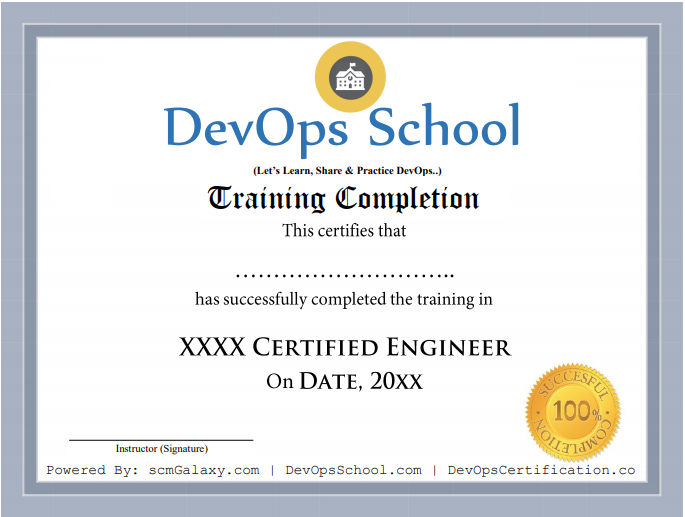
Reviews
By having an excellent journey with 8000+ participants from different countries we have got excellent reviews that helps us stand out of other institutes and being proud. We proudly can say we have helped so many individuals and working professionals to build their career. Here are some of the reviews that we have got from our participants who are happy by being a part of DevOpsSchool.
Videos
Projects
During this training you will get a real-time based project to work on, which will help you to implement your learnings and also it will boost your knowledge and skills. With important tools and platforms you will have real-world experience where we help you to visualize a real development environment, testing environment and production environments.
FAQs
1. Will I get technical support after completion of training?
- Yes, Its free of cost for life time. We will give you can access of our Google drive where you can drop you query and our trainers will respond you back.
2. Why should I learn Datadog course online instead of offline?
- First this is the best option to keep you and your instructor safe in this dangerous pendamic. As well as the environment and benefits what you will get in offline classes same we will provide you in online classes. We will make your experience much better and comfortable than offline classes. That’s why we provide live and instructor-led online classes where you can interact your instructor to clear your doubts.
3. How long will it take to complete the course?
- It will take approx 20 Hrs to fully complete the course.
4. Will I get any placements after the training?
- Well we don’t provide any placements as of now but we can provide you an interview kit to help you out.
5. What are the pre-requisies to learn Splunk?
- There are no prerequisites for Splunk Program. As we are going to start from scratch, you can add yourself in this program to get the complete knowledge about Splunk. Even, if any aspirant is planning to enter the IT world or Splunk this course will help them to get all the job-ready skills.
6. Can a non technical person learn Datadog?
- Yes, but it will be very hard to learn because here the technical words and platforms will be used that he will be not aware of so in my recommendation you shouldn’t try but if still if you want to then you should be very concentrated and honest with you as you have to work hard.
7. Do you have online classes or offline classes?
- As of now online classes but he it is a group of people requirement then we can have discussion about offline classes.
8. Will I get the job after completing this course?
- Yes, you will be fully capable to perform any task given to you by your domain senior or manager. As you will be certified engineer who will have all the required skills and knowledge to perform any task.
9. Which kind of certification will DevOpsSchool provide?
- It’s a completion certificate. It will show that you have successfully completed the training and have the right skills and knowledge to perform the task assigned by your company.
10. Why learn Splunk?
- Splunk is widely implemented in the IT industry. With the emergence in big data, Splunk has also seen wide acceptance among the technology giants to store and process large volumes of data. This has led to a higher number of requirements for professionals expertize in Splunk in the job market. Splunk learning can help you take your career forward.
11. Who will be my trainer?
- As we have so many trainers its not possible to tell you quickly, as we have to go through their availability. But we can assure you you will get a best trainer as we have a group of best trainers who are very experienced and skillful trainers. They have 15+ iT working experience.
12. Can I get a demo session?
No we don’t provide any demo class but instead of that we can provide you a class recordings so you can decide.
13. Do we have classroom training?
Yes, Classroom training is available in Bangalore, Hyderabad, Chennai and Delhi location. Apart from these cities classroom session can be possible if the number of participants are 6 plus in that specific city.
14. How will I execute the Practicals?
All the Demo/Hands-on are to be executed by our trainers on DevOpsSchool’s AWS cloud. We will provide you the step-wise guide to set up the LAB which will be used for doing the hands-on exercises, assignments, etc. Participants can practice by setting up the instances in AWS FREE tier account or they can use Virtual Machines (VMs) for practicals.
15. What if I miss any class?
In case if you miss the class then there are two ways to get to know what topics has been covered, i.e 1st- We will share the class recordings, notes etc to you and 2nd – you can attend any other session under 3 months of time period.
Our Gallery
